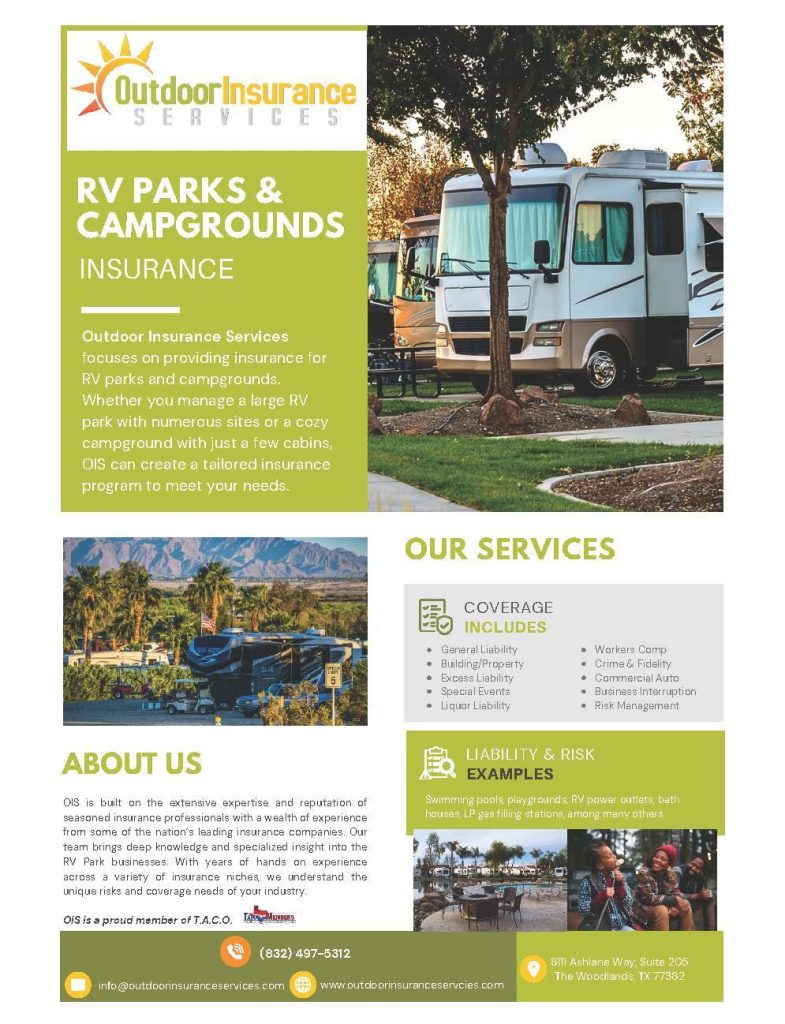When hitting the open road in your RV, the freedom to explore new destinations is exhilarating. However, alongside the excitement of camping and adventure comes the important responsibility of protecting your investment—and yourself—from unexpected mishaps. One critical component of RV insurance that often goes overlooked is campsite liability coverage. Understanding this essential aspect can save you from costly surprises and ensure peace of mind while you enjoy your travels. In this article, we’ll break down what campsite liability coverage entails, why it matters, and how to make sure your RV insurance policy has you covered when it counts.
Table of Contents
- Understanding Campsite Liability Coverage and Its Importance for RV Owners
- Key Risks Covered by Campsite Liability Insurance
- How to Choose the Right Campsite Liability Coverage for Your RV
- Practical Tips for Filing a Campsite Liability Insurance Claim
- In Conclusion
Understanding Campsite Liability Coverage and Its Importance for RV Owners
When parking your RV at a campsite, many RV owners overlook a crucial aspect of protection: liability coverage that specifically addresses potential incidents on campground grounds. This coverage steps in when accidents occur that might otherwise leave you financially responsible — such as if your RV accidentally causes damage to another camper’s property or if someone sustains an injury while visiting your site. Unlike general auto insurance, campsite liability coverage extends to situations that happen while your vehicle is stationary but still under your control, making it an essential layer of security for peace of mind during your travels.
Key benefits of campsite liability coverage include:
- Protection against claims arising from property damage within the campsite
- Coverage for medical expenses if someone is injured near your RV
- Legal defense costs in case of lawsuits linked to campsite incidents
By understanding this specialized form of coverage, RV owners can prevent costly out-of-pocket expenses and enjoy a worry-free experience. It’s a smart investment that complements your existing RV insurance and safeguards you in one of the most common environments where risks can arise.
Key Risks Covered by Campsite Liability Insurance
When you park your RV at a campsite, various risks lurk beyond just the physical safety of your vehicle. Campsite liability insurance steps in to cover unexpected incidents involving third parties, typically when bodily injury or property damage occurs on your rented or owned campsite. This includes accidents like a guest tripping over your equipment, damage caused by pets, or even environmental harm such as fires that could potentially spread to neighboring plots. Essentially, it acts as a financial shield protecting you from steep legal claims or medical expenses arising from these mishaps.
Moreover, this coverage extends to several nuanced situations that many RV owners might overlook. These can include:
- Slip and fall injuries on uneven campsite terrain
- Damage to shared amenities, such as communal grills or picnic tables
- Loss or damage to someone else’s personal property within your campsite area
- Liability resulting from fires, especially related to campfires or cooking equipment
Understanding these potential liabilities helps you maintain peace of mind while enjoying your travels, knowing that you are protected from many of the common yet costly risks encountered in camping environments.
How to Choose the Right Campsite Liability Coverage for Your RV
When selecting campsite liability coverage for your RV, it’s crucial to evaluate the specific risks associated with your camping style and frequency. Consider factors such as the typical locations you visit, whether they are public campgrounds, private RV resorts, or remote wilderness sites. These details impact the level of protection you need against potential damages or injuries on the campsite premises. Additionally, analyze the coverage limits and exclusions carefully—higher limits provide better financial security, but may come with increased premiums. Balance your risk tolerance with affordability to ensure you’re adequately protected without overspending.
To make a well-informed decision, keep these essentials in mind:
- Scope of Coverage: Make sure the policy covers accidental property damage to campsite facilities and third-party injuries.
- Policy Limits: Choose limits that align with the potential costs of accidents, including medical expenses and legal fees.
- Deductibles and Premiums: Evaluate the trade-off between out-of-pocket expenses and monthly or annual costs.
- Additional Riders: Look for optional add-ons that protect against specific risks like fire damage or watercraft liability if applicable.
By prioritizing these aspects, you can tailor a liability coverage plan that safeguards your adventure and keeps your peace of mind intact, wherever your RV takes you.
Practical Tips for Filing a Campsite Liability Insurance Claim
When you find yourself needing to file a claim related to campsite liability, acting promptly and methodically is crucial. First, document the incident thoroughly by taking clear photos or videos of the scene, including any damages or injuries involved. Make sure to exchange contact information with all parties and gather witness statements if possible. These details will form a solid foundation for your claim and can significantly expedite the review process.
Next, notify your insurance provider as soon as possible—don’t wait for a formal demand or lawsuit to be filed. Keep detailed records of all communications, including phone calls, emails, and written correspondence. Providing accurate, honest information helps avoid delays or claim denials. Additionally, maintain copies of any receipts or repair estimates as they often are required to validate your claim. Following these steps helps ensure a smoother, more efficient experience with your campsite liability insurance coverage.
In Conclusion
Incorporating campsite liability coverage into your RV insurance policy is a vital step toward protecting yourself from unforeseen financial risks while enjoying the great outdoors. Understanding the essentials of this coverage empowers you to make informed decisions and ensures peace of mind during every adventure. As you plan your next trip, take the time to review your policy, ask the right questions, and choose coverage that fits your unique needs. After all, responsible RV ownership means being prepared—not just on the road, but wherever you set up camp. Safe travels!





